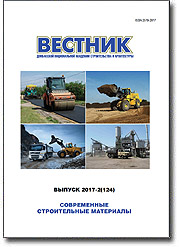Effect of Modification Petroleum Bitumen by Reactivity Oligomers its Thermal Oxidative Stability in Layers of Varying Thickness
Abstract: The paper examines the impact of the modification of bitumen reactivity oligomers (PCO) on its thermal oxidative stability in layers of varying thickness. Thermal oxidative stability was evaluated by the average specific speed (vud) changes the mass of bitumen (per unit surface area and time of exposure). Elvaloy AM (etilenglitsidilakrilat) in combination with a polyphosphoric acid has been used as reactive oligomers. The dependences (at 163 °C and 5 h exposure) on the thickness of the layer of bitumen (δ), which are different for δ > δkr and δ < δkr (δkr – layer thickness at which all asphalt layer involved in thermal oxidation process) have been given. It has been shown that the modification of the bitumen reduces the RIS and δkr and vud (i. e., to increase the thermal oxidative stability).
Keywords: modified bitumen road, reactivity oligomers Elvaloy AM, polyphosphoric acid, thermal oxidative stability in layers of different thicknesses.
Pages: 45-52.
For citation:
For citation: Pakter, M. K.; Bespalov, V. L.; Samoylova, Ye. A. [et al.]. Effect of Modification Petroleum Bitumen by Reactivity Oligomers its Thermal Oxidative Stability in Layers of Varying Thickness. – Text : electronic. – In: <em>Proceeding of the Donbas National Academy of Civil Engineering and Architecture</em>. – 2017. – Issue 2017-2(124) Modern building materials. – Р. 45-52. – URL: https://donnasa.ru/publish_house/journals/vestnik/2017/2017-2(124)/st_07_pakter_bespalov_samoylova_stukalov_ananyev_naumenko.pdf (date of access: 02.01.2026). – ISSN 2519-2817.

Issue 2017-2 (124)
Journal: Proceeding of the Donbas National Academy of Civil Engineering and Architecture
Publish house: Donbas National Academy of Civil Engineering and Architecture
Journal: Proceeding of the Donbas National Academy of Civil Engineering and Architecture
Publish house: Donbas National Academy of Civil Engineering and Architecture
